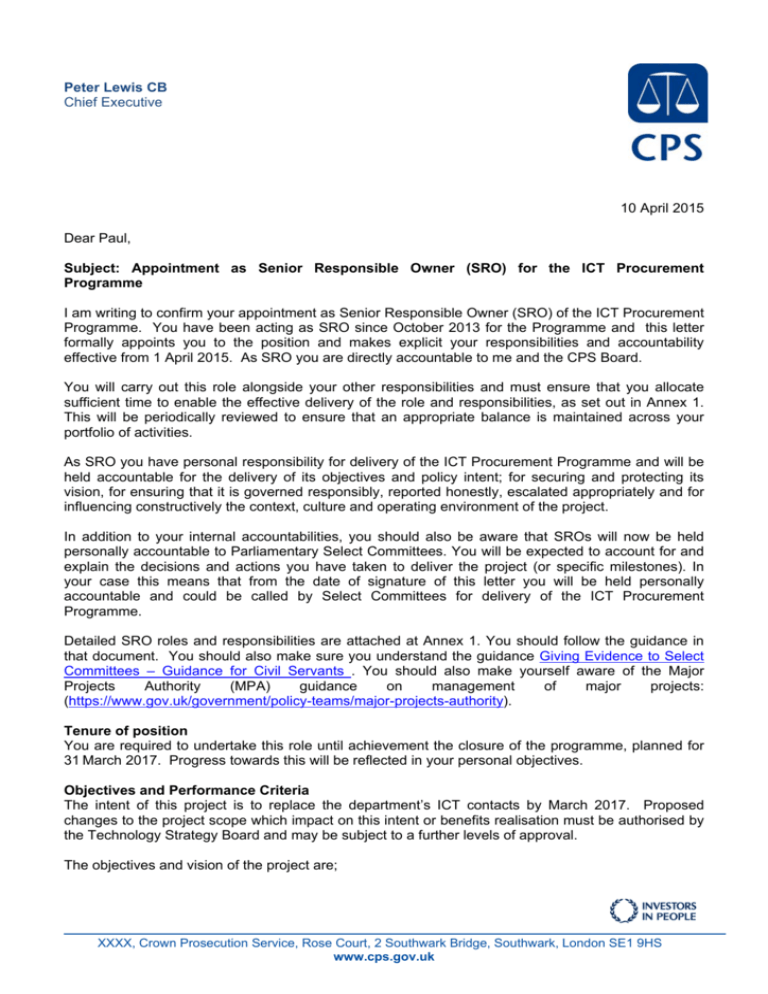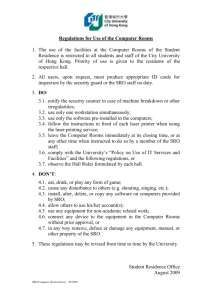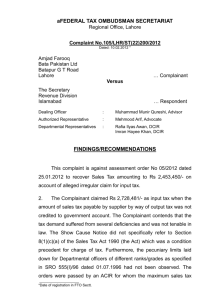Senior Responsible Officer letter, Adobe PDF document, approx 85kb
advertisement

Peter Lewis CB Chief Executive 10 April 2015 Dear Paul, Subject: Appointment as Senior Responsible Owner (SRO) for the ICT Procurement Programme I am writing to confirm your appointment as Senior Responsible Owner (SRO) of the ICT Procurement Programme. You have been acting as SRO since October 2013 for the Programme and this letter formally appoints you to the position and makes explicit your responsibilities and accountability effective from 1 April 2015. As SRO you are directly accountable to me and the CPS Board. You will carry out this role alongside your other responsibilities and must ensure that you allocate sufficient time to enable the effective delivery of the role and responsibilities, as set out in Annex 1. This will be periodically reviewed to ensure that an appropriate balance is maintained across your portfolio of activities. As SRO you have personal responsibility for delivery of the ICT Procurement Programme and will be held accountable for the delivery of its objectives and policy intent; for securing and protecting its vision, for ensuring that it is governed responsibly, reported honestly, escalated appropriately and for influencing constructively the context, culture and operating environment of the project. In addition to your internal accountabilities, you should also be aware that SROs will now be held personally accountable to Parliamentary Select Committees. You will be expected to account for and explain the decisions and actions you have taken to deliver the project (or specific milestones). In your case this means that from the date of signature of this letter you will be held personally accountable and could be called by Select Committees for delivery of the ICT Procurement Programme. Detailed SRO roles and responsibilities are attached at Annex 1. You should follow the guidance in that document. You should also make sure you understand the guidance Giving Evidence to Select Committees – Guidance for Civil Servants . You should also make yourself aware of the Major Projects Authority (MPA) guidance on management of major projects: (https://www.gov.uk/government/policy-teams/major-projects-authority). Tenure of position You are required to undertake this role until achievement the closure of the programme, planned for 31 March 2017. Progress towards this will be reflected in your personal objectives. Objectives and Performance Criteria The intent of this project is to replace the department’s ICT contacts by March 2017. Proposed changes to the project scope which impact on this intent or benefits realisation must be authorised by the Technology Strategy Board and may be subject to a further levels of approval. The objectives and vision of the project are; XXXX, Crown Prosecution Service, Rose Court, 2 Southwark Bridge, Southwark, London SE1 9HS www.cps.gov.uk Ensure continuity of service – prior to transition, at transition and ongoing, Align services with the MoJ Alignment with the government’s Technology Code of Practice. Take greater direct control over the management of technology Realise like for like cost reductions of at least 15% by 2017, Match or improved service levels, Support the CJSEP, CPP and CPS digital strategy, Exploit new technologies where they are cost beneficial and they meet all other ICT, Security, Operational and Business requirements, Ensure an open and competitive procurement methodology in line with current guidance, Operate within all relevant policies and governance; principally, Financial, Security, HR, Privacy, Procurement. Extent and limit of accountability (1) Finance and Controls HMT spending controls will apply on the basis set out within your department’s delegated authority letter. Where the ICT Procurement Programme exceeds the delegated authority set by HMT, the Treasury Approval Point process will apply and the details of each approval process must be agreed with your HMT spending team. You should also note that where expenditure is considered novel, contentious, repercussive or likely to result in costs to other parts of the public sector, HMT approval will be required, regardless of whether the programme expenditure exceeds the delegated authority set by HMT. If in doubt about whether approval is required you should consult the HMT spending team. Your project team is broken down as follows:Paul Staff SRO Mark Williams Programme Executive Peter Forbes Gill Santos Programme Manager Senior Exit Manager James Vivyan Wayne Zakaria Jackie Palmer PMO Technical Lead Exit Manager Colin Lighten Transition Manager Jan Tilling Procurement Lead Kulbiro Dhillon Procurement Lead You should operate at all times within the rules set out in Managing public money. In addition, you must be mindful of, and act in accordance with, the specific Treasury delegated limits and Cabinet Office controls relevant to the ICT Procurement Programme. Information on these controls can be found here: Cabinet Office controls (2) Delegated departmental/project authority 2 you are authorised to approve expenditure within your delegated authority limits you are authorised to agree project rescheduling within 3 months of agreed milestones, but rescheduling beyond that must be agreed with me and the Technology Strategy Board. you are also responsible for recommending to the Executive Group the need to either pause or terminate the programme where necessary and in a timely manner. where issues arise which you are unable to resolve, you are responsible for escalating these issues to the Executive Group. Major Projects Leadership Academy (MPLA) As SRO of a GMPP project, you will be required to enrol on the MPLA. You will be contacted shortly by a member of the MPA Leadership and Capabilities team to discuss this. To widen experience and understanding of the role, SROs are expected to become accredited Major Project reviewers and to lead or participate in such reviews for other Government departments, the wider public sector or other areas of the Crown Prosecution Service as appropriate. You will be required to participate in such reviews at least once every 12 months to maintain your accreditation We would like to take this opportunity to wish you success in your role as SRO. Yours sincerely, PETER LEWIS CHIEF EXECUTIVE I confirm that I accept the appointment including my personal accountability for implementation of the project as detailed in the letter above. Name of SRO: Paul Staff Signature of SRO: Date: 13th April 2015 3 SRO Role and Responsibilities Annex 1 The Role of the Senior Responsible Owner (SRO) You are personally accountable for ensuring the ongoing delivery of the ICT Procurement Programme. You are responsible for securing the resources necessary for the success of the project and for the ensuring that the related implementation and transition activities realise the agreed objectives and benefits. You will be personally accountable to Parliamentary Select Committees and be expected to explain the decisions and actions you have taken. This could include where a Minister has intervened to change the project during the implementation phase in a way which has implications for the cost and/or timeline of implementation. You will be able to disclose your advice about any such changes. You must ensure the effectiveness of the governance, assurance and project management arrangements and maintain them throughout the life of the programme. You should adopt best practice and be prepared to justify any deviation from it, in line with guidance published by the Cabinet Office (Efficiency and Reform Group 19). An SRO will: Be a visible, engaged and active project leader, not a figurehead; Deliver the agreed outcomes and benefits; Create an open, honest and positive culture committed to delivering at pace; Challenge senior officers and Ministers when appropriate and escalate quickly; Provide appropriate support, steer and strategic focus to the Project Director and ensure that they have a clear and current letter of appointment; and Have sufficient time, experience and the right skills to carry the full responsibilities of the role. Specific SRO accountabilities: Ensure that the project is set up for success Ensure that the project is set-up to make an unambiguous and demonstrable link to strategic policy; Translate this policy intent into clear deliverables which are established and agreed with senior stakeholders; Carry out a robust and commercially viable options appraisal, which balances risk with opportunity, as part of initial project feasibility; Establish a firm business case for the project during the initiation/definition phase and ensure that any planned change continues to be aligned with the business; Identify and secure the necessary investment for the business case (this includes both budget and operational resource); Design and implement robust, appropriate and transparent project governance; Build strong and effective relationships with key stakeholders, justifying their trust and retaining their confidence, and obtain their commitment to benefits realisation. Ensure that the project meets its objectives and delivers the projected benefits Gain agreement to the project objectives and benefits amongst stakeholders, including Ministers where appropriate; Understand the broader government perspective and its impact on the project; Ensure the strategic fit of the project objectives and benefits; 4 Agree a clear and simple approach to performance management and monitor delivery of the objectives and benefits, taking appropriate action where necessary to ensure their successful delivery. Develop the project organisation structure and plan Ensure that there is a coherent organisation structure and appropriately detailed project plan; Build the right team, securing necessary resources and skills and providing clear lines of accountability; Provide appropriate support, steer and strategic focus to the Project Director. Monitor and take control of progress Monitor and control the progress of the project at a strategic level, being honest and frank about project progress, risks and issues; Ensure that any changes to agreed project benefits are flagged appropriately within project governance and that the business case is updated accordingly (throughout project lifecycle); Ensure that the integrity of the project is maintained and speak truth to power – including to Parliamentary Select Committees; Communicate effectively with senior stakeholders regarding project progress and provide clear, appropriate and delivery-focused decisions and advice to the Project Director. Ensure problem resolution and referral processes are appropriate and effective Identify, understand and drive the successful mitigation of project risks; Escalate serious issues quickly and with confidence to senior management and/or Ministers; Develop strong and effective engagement between the project team and its stakeholders and sponsors; Ensure that communication processes are effective and that the project’s objectives and deliverables continue to be consistent with the organisation’s strategic direction. Ensure that the project or programme is subject to review at appropriate stages Recognise the value of robust project review and ensure it occurs at key points in the project lifecycle, particularly at the pre-initiation (feasibility) and initiation stages; Make certain that any recommendations or concerns from reviews are met or addressed in a timely manner; In the event of a “red” or “amber-red” review or a red or amber-red quarterly GMPP review rating, ensure that the Permanent Secretary has been made aware of the situation and has been briefed accordingly. Manage formal project closure Formally close the project or programme and ensure that the lessons learned are documented within the final evaluation report and disseminated to key stakeholders; Ensure that the post implementation review takes place and that the output is communicated to the appropriate stakeholders; Ensure a plan for both long term benefits realisation and on-going sustainability is agreed with key stakeholders as part of the process of moving the project to “business as usual” . 5








